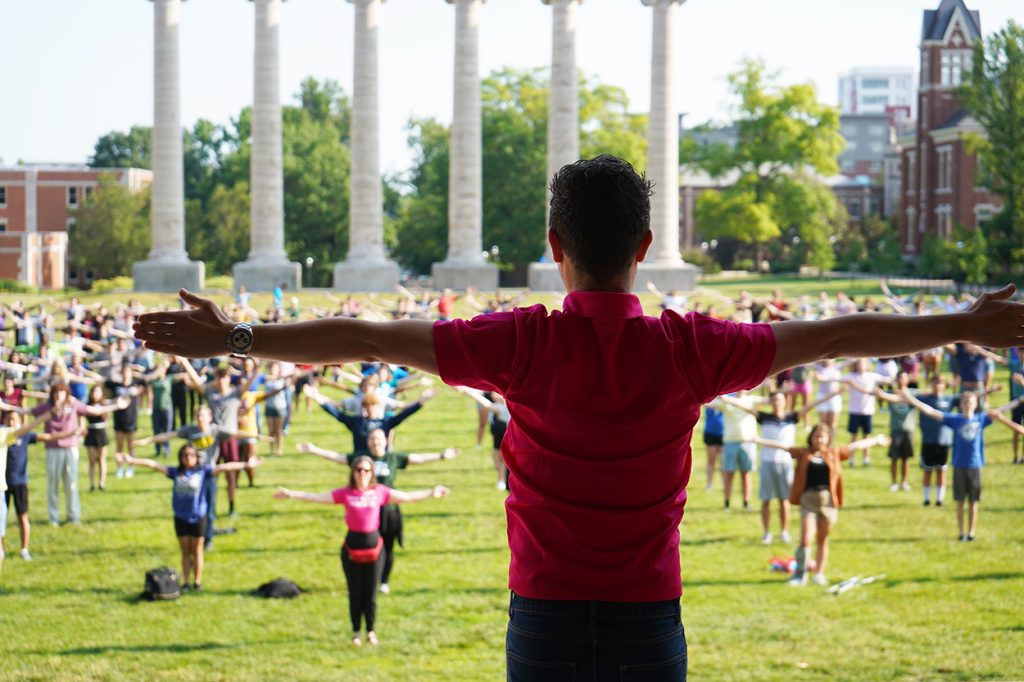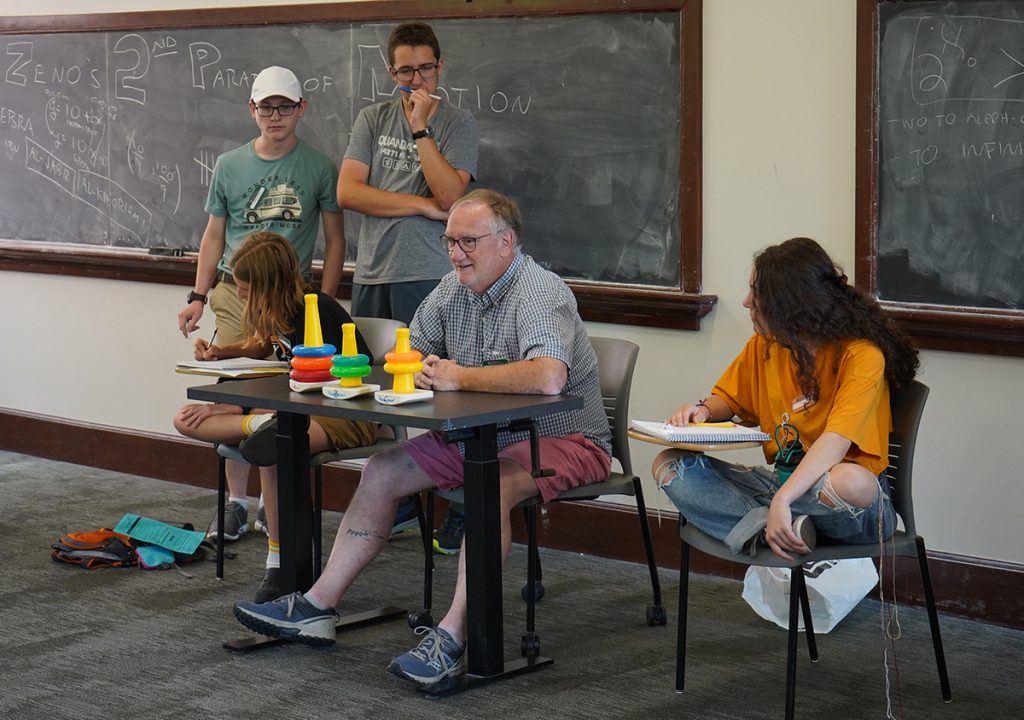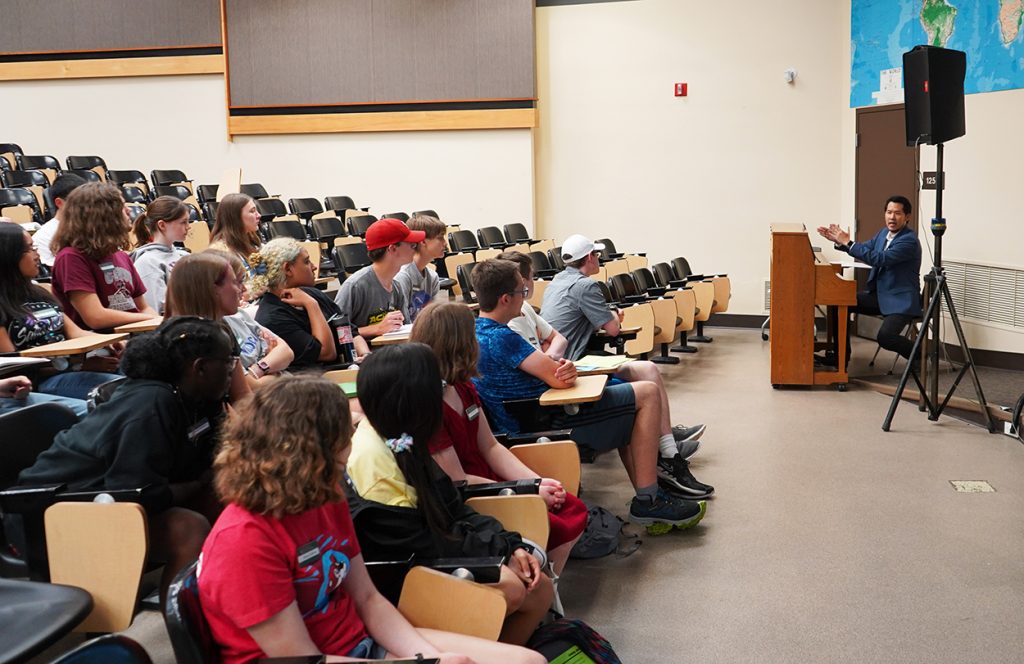Published on July 31, 2023

Each June, more than 300 rising high school juniors from across Missouri gather in Columbia for three weeks of exceptional educational enrichment through the Missouri Scholars Academy (MSA). These gifted students congregate on the University of Missouri campus for a specially designed curriculum with interdisciplinary courses and a variety of stimulating extracurricular activities.
The Academy is administered by the MU Honors College and enables students to be part of a unique learning community. This year’s program, which ran from June 11 through July 1, was no different.
“It’s always remarkable how fast and how tight knit of a community that the scholars, who are basically strangers, build by the end of the first week,” said Steve Keller, co-director of MSA and an associate professor of chemistry at Mizzou. Keller has served in a director role since 2015. “They become friends for life. This happens every year, so the programming is definitely worthwhile, but the scholars also seek those relationships out. It’s really rewarding to see them come together through shared interests and passions.”

MSA offers students unique opportunities to enhance their academic skills; discuss contemporary issues; deepen understanding of themselves and their abilities; and engage others in critical-thinking and problem-solving activities.
Scholars spend three hours each day, for six days a week, in intensive academic pursuits through their major course. Those classes are focused on four primary academic offerings – mathematics, science, social studies and humanities. They also spend an hour in their minor course, which is typically in a different field than their major class.
“Serving as faculty for the Academy is incredible,” said Doug Valentine, co-director of MSA and an assistant teaching professor of sociology at MU. “Seeing how the scholars grow throughout the program is special. They don’t all change in the same way; everyone is slightly different. But to witness those changes firsthand makes every minute of teaching worth it.”
Keller and Valentine work closely with Rachel Harper, associate director of MSA and associate dean of the Honors College, to make sure the entire Academy runs smoothly.
“We all support each other in various ways,” Valentine said. “Having multiple leads allows us to still pursue our passions during the Academy, too. I love being in the classroom, and I was able to continue teaching my minor class, even as a co-director, because of the balance of responsibilities.”
Valentine has been teaching at MSA since 2012. In addition to his co-director role this year, he taught a minor course focused on sociology. Valentine is one of several Mizzou faculty members who share their expertise with scholars at the Academy. Those professors are joined by individuals from other universities and professions. MSA faculty also get help from numerous residential assistants (RAs), who spend time guiding the scholars throughout the Academy. The RAs typically consist of previous MSA scholars.
“The RAs that are former scholar consistently pay it forward,” Keller said. “They had a great Academy experience, and they are key to facilitating that experience for the current class. The RAs who weren’t scholars embrace the MSA mentality and traditions almost immediately.”

In addition to the major and minor courses, scholars participate in afternoon activities and evening programming. Guest lecturers, special presentations and interesting courses highlight that programming. Activities included floral design classes, Magic the Gathering strategy sessions, metalsmithing tutorials and, this year, they had an opportunity to talk with Desiree Reed-Francois, the director of athletics for Mizzou.
Those specials are spearheaded by Brian Stuhlman, who is the programming coordinator for MSA, as well as the coordinator of middle school programs at Mizzou Academy.
“It’s so much fun to see our faculty and presenters come back year after year,” Valentine said. “I heard from multiple scholars about how great the programming was this year. A lot of them felt like some of the activities should be required for every scholar in the future. That really speaks to how strong our speakers and presenters are.”
Weekends during the Academy are full of academic pursuits, too, including several service opportunities. MSA also hosted a Teacher Appreciation Day and Alumni Day during the second weekend. Both events allow for connection and camaraderie.
While the Teacher Appreciation Day brings educators from across the state in to highlight the important work they do, this year’s event included a banquet that was sponsored by the Kinder Institute for Constitutional Democracy.
“We haven’t been able to host that type of banquet for several years, so it was a really nice opportunity to make a big splash for our teachers,” Keller said. “We want our teachers to feel appreciated, as they’re one of the main reasons why our scholars are where they are. We’re thankful for Kinder for making this a possibility, and we’re very hopeful that we’ll be able to continue this tradition.”
MSA was completely funded by the Missouri legislature for all attendees this year, and, as of now, next year’s Academy has the same level of state support.
“Funding gifted education is vital,” Keller said. “While we do have scholarships available, it gives everyone such a peace of mind to have the funding secured. It also demonstrates that the state values making unique opportunities available to our best and brightest young people. The Academy is an incredible experience, and we want to continue to be able to offer it to students from across the state, no matter their financial situation.”